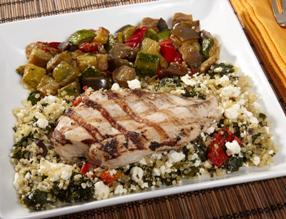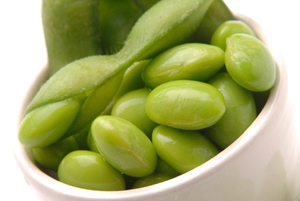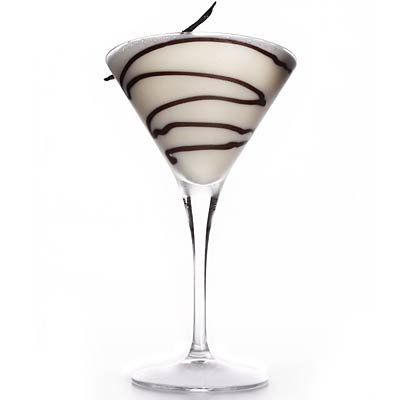The Mediterranean Diet Secret is Out
The Mediterranean Diet Secret is Out

We can stop wondering. It looks like an olive a day is really what keeps the doctor away, or the oncologist, at least.
While I've often lauded the virtues of the Mediterranean diet, and cited its many apparent health benefits, I've had to acknowledge that scientists hadn't really put a collective finger on what it was about that diet that makes it so good for us.
But at least where cancer prevention is concerned, now they have. It seems the oleic acid in all that olive oil suppresses cancerous cell growth.
When I talk about the Mediterranean diet, that's "diet" with a small "d." I don't mean some fad or hotly marketed weight-loss program, but rather, just the array of fresh fruits, vegetables, seafood, whole grains, olive oil, nuts, beans, and a little vino that is the traditional fare of Mediterranean folks.
With that sort of fare, you can see easily enough why it would be generally be a pretty healthy way to eat. The Mediterranean diet is strongly associated with extended life span and reduced risks for mortality from any cause, as well as reducing the risks for heart disease and cardiovascular problems, obesity and even breast cancer.
But scientists just didn't know why.
Now a team at Northwestern University says it's the oleic acid in all that olive oil.
Yep. Every time you shake a little extra virgin on your salad or dip a piece of antipasto in it, you're practicing a bit of very specific preventive medicine. It appears that oleic acid suppresses the function of oncogenes, the genes that cause regular cells to mutate and grow into tumors, instead of what they're supposed to be.
About a million women every year are diagnosed with breast cancer, which accounts for about 1.6 percent of all female deaths annually worldwide.
And there's an oncogene called HER-2/neu that is found in about 30 percent of all breast cancer patients. Dr Javier Menendez, of Northwestern University Feinberg School of Medicine, said his team has determined that oleic acid blocks the action of the HER-2/neu oncogene.
In controlled studies of breast cancer cells. Menendez and his team explored just how it is that oleic acid worked on those cells. They were able to determine that oleic acid regulates the HER-2 oncogene, considered the most significant in breast cancer. While important advances in early detection mean that the prognosis for most discovered breast cancers is very good today, breast cancer patients with HER-2/neu tumors suffer from an aggressive form of the disease, and don't have as positive a prognosis.
But the olive oil discovery may offer a double benefit for these women. Menendez' team also found that oleic acid not only suppressed the action of the oncogene, it also improved the effectiveness of a popular breast cancer drug called Herceptin. Even though oleic acid works against the oncogene in a different way than Herceptin, it nevertheless enchanced the drug's own effectiveness.
That's not the only new look into Mediterranean eating lately. While all that work was underway focusing on oleic acid, another recent study of Europeans aged 70 to 90 found that those who stuck most closely to the Mediterranean diet had a 23 percent lower chance of dying during the 10-year period of the study.
Now, these were folks who were on in years to begin with, much like the demographic of Southwest Florida. Anything that could offer a 23 percent differential in death rate at that age deserves a little respect.
But the news only gets better. When they combined that diet with a little exercise, participants in the European study found they lowered their risk another 35 percent. And a moderate alcohol intake lowered it yet again, by another 22 percent.
Now this isn't license to go out and fill up on olive oil and chianti. Please note that this was moderate alcohol intake, and the folks were participating in these studies with controlled portions and limitations on their choices.
If you're going to try to start eating Mediterranean, you can't just load all these excellent foods in on top of whatever you're already eating. And pouring olive oil over it won't help either. You have to make a tradeoff, because even if the olive oil itself is beneficial, too much of a good thing usually means diminishing returns on its benefits. Olive oil is still very high in calories and weight gain is a risk for anyone who isn't reasonable and prudent.
Remember that if you're trying to maintain a healthy weight, it's a zero sum game. If you're going to add something in to your regular diet, even something very good, something else has to go so that you can keep your overall calorie counts level.
So, by all means, bring in the olive oil dip for those sliced veggies, but simply put away the mayonnaise.
Through Thick & Thin:
The facts are in, and olive oil is your hero when it comes to protecting against breast cancer. So add some to your cooking, or use a bit for dipping. But remember that even if it comes with distinct benefits, it's still a fat, and a very high-calorie foods, so it should be taken in small doses.
- Prev:Low Salt Diet
- Next:BistroMD: Nutrisystem Meal Plan
-
Diet To Quick Weight Loss Fast
If you are looking for a diet to lose weight fast, you may not have t
-
4 Quick Exercises To Get Rid Of Underarm Flab And Back Bulge In 3 Weeks
Due to the unpleasant appearance, every woman feels uncomfortable
-
Trends in the Dieting Industry
From personal chefs and diet deli
-
7 Refreshing Summer Drinks That Shrink Your Belly
Although you may be convinced that you should say goodbye to your
-
Vegan Diet: How to Get the Nutrients You Need
What is a vegan diet? People who follow a vegan diet avo
-
The Flexitarian Diet: What To Know
Overview
- DON'T MISS
- Daily Diet Contributes To Our Health
- Best Ways To Lose Weight
- Drink This Before Going To Bed And Burn Stomach Fat Instantly
- Healthy Eating – Shopping Tips
- Diet plan – “Why is your Diet Plan May Not Be Working”
- Weight Loss Diet
- Caffit Dieting Blend � A Great Substitute To Steam Bath!
- Healthy Ways to Indulge With Food
- How To Do Complete Body Sugar Detox, Lose Weight And Improve Your Health
- How to Get Back on Track After Overeating




